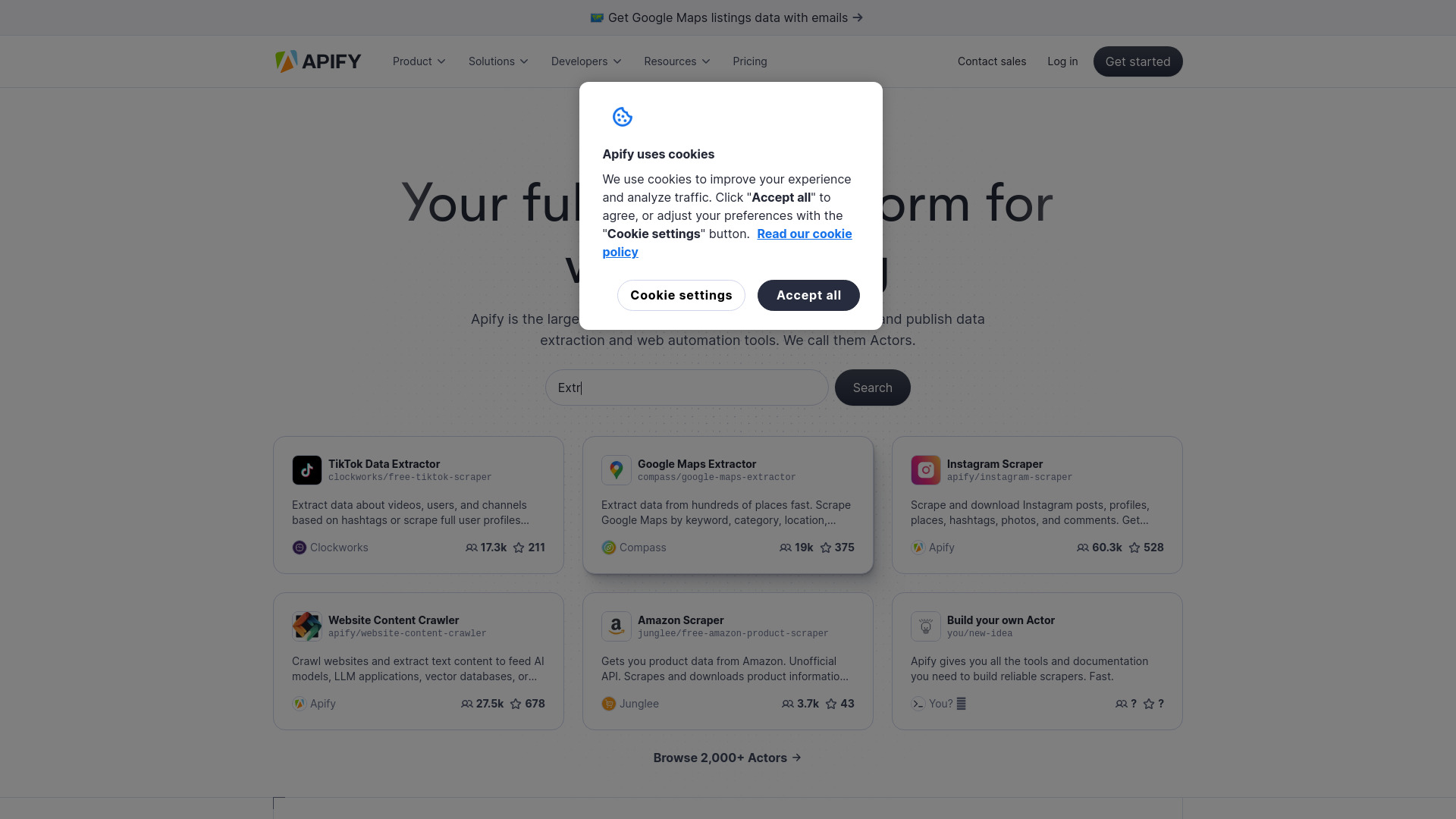
Apify
Open Website-
Tool Introduction:Apify AI: Full-stack web scraping, AI agents, proxies, and automation.
-
Inclusion Date:Oct 21, 2025
-
Social Media & Email:
Tool Information
What is Apify AI
Apify AI is a full-stack platform for building, deploying, and scaling web scrapers, AI agents, and automation workflows. It combines a marketplace of ready-made actors with code templates and SDKs, so developers can extract data from websites, orchestrate crawlers, and integrate results into apps or BI tools. With managed queues, storage, schedulers, and robust APIs, it handles the heavy lifting of web scraping and data extraction. Apify AI also supports Crawlee, offers anti-blocking strategies and proxy management, and enables reliable, compliant automation at scale.
Apify AI Main Features
- Actor marketplace and templates: Launch ready-made scrapers and automation tools or fork templates to speed up development.
- Crawlee SDK + API-first platform: Build resilient crawlers with Crawlee, then run them on managed infrastructure via REST API, webhooks, and CLI.
- Anti-blocking and proxy management: Rotate residential and datacenter proxies, tune headers and delays, and reduce CAPTCHA/ban rates.
- Headless browser automation: Use Puppeteer/Playwright for JavaScript-heavy sites, logins, forms, and complex user flows.
- Data storage and export: Persist results in datasets and key-value stores; export to JSON, CSV, Excel, or push to S3/BigQuery.
- Scheduling and scaling: Cron-like schedules, queues, and autoscaling let you run recurring jobs and high-concurrency crawls.
- AI agent orchestration: Combine LLMs with scraping and actions to create agents that search, extract, and act across the web.
- Monitoring and governance: Logs, metrics, versioning, and access controls help maintain reliability and team collaboration.
- Integrations: Connect via webhooks, Zapier/Make, Google Sheets, and custom pipelines to feed data into existing systems.
Who Should Use Apify AI
Apify AI fits developers, data engineers, growth and SEO teams, product and competitive intelligence analysts, e-commerce operations, researchers, and ML engineers. It works for use cases like SERP tracking, price monitoring, lead generation, content aggregation, market research, risk and compliance checks, and powering retrieval pipelines for AI applications.
How to Use Apify AI
- Sign up and browse the marketplace to select a ready-made actor or start from a template/Crawlee project.
- Define inputs: target URLs, search terms, pagination rules, and CSS/XPath selectors or browser actions.
- Configure proxy settings, concurrency, timeouts, and anti-blocking strategies.
- Run a test crawl, inspect logs and sample output, and refine extraction logic.
- Schedule recurring runs and scale with queues and autoscaling settings.
- Export results to JSON/CSV or send them to S3/BigQuery; integrate via API or webhooks.
- Optionally publish your actor to share with your team or the marketplace.
- Monitor runs, set alerts, and iterate on performance and quality.
Apify AI Industry Examples
- E-commerce: Track competitor prices, availability, and reviews across thousands of product pages for dynamic pricing and catalog enrichment.
- Finance and research: Aggregate alternative data such as news, filings, and sentiment sources to support market analysis.
- Travel and real estate: Collect listings, fares, and amenities to power comparison sites and analytics dashboards.
- Marketing and SEO: Scrape SERPs, backlinks, and content metadata to inform content strategy and outreach.
- Operations: Build AI agents that verify listings, update content, or triage tickets by extracting facts from web portals.
Apify AI Pricing Model
Apify AI typically combines usage-based pricing for compute and proxy traffic with paid tiers that increase limits, add collaboration features, and provide support options. Many users start with a free tier or trial to evaluate workflows before scaling to higher volumes or enterprise arrangements.
Apify AI Pros and Cons
Pros:
- End-to-end stack: marketplace, SDKs, storage, scheduling, and APIs in one platform.
- Strong anti-blocking and proxy options for reliable, large-scale data extraction.
- First-class support for headless browsers and JavaScript-heavy sites.
- Flexible integrations (webhooks, Sheets, Zapier/Make, S3, BigQuery) for downstream workflows.
- Open-source synergy with Crawlee and familiar developer tooling.
Cons:
- Learning curve for complex dynamic sites and large-scale orchestration.
- Proxy and compute costs can grow with volume and frequency.
- Scraping policies vary by site and jurisdiction; careful compliance management is required.
- Ongoing maintenance needed as websites change structure and anti-bot measures evolve.
Apify AI FAQs
-
Is web scraping with Apify AI legal?
Legality depends on the target site’s terms, the data type, and jurisdiction. Configure rate limits, abide by policies, avoid personal data without consent, and consult legal counsel when in doubt.
-
Do I need to code to use Apify AI?
No. You can start with marketplace actors and templates. For advanced workflows, use Crawlee and headless browsers to build custom logic.
-
How does Apify AI reduce blocking and CAPTCHAs?
It supports proxy rotation, realistic browser fingerprints, throttling, retries, and headless browser automation to mimic human behavior and increase success rates.
-
How do I integrate Apify AI output with my stack?
Access datasets via API, export to JSON/CSV, stream via webhooks, or connect to destinations like S3, BigQuery, Sheets, Zapier, and Make.
-
Can Apify AI run at scale?
Yes. Use managed queues, concurrency controls, and autoscaling to handle large site lists, frequent schedules, and high-throughput pipelines.


